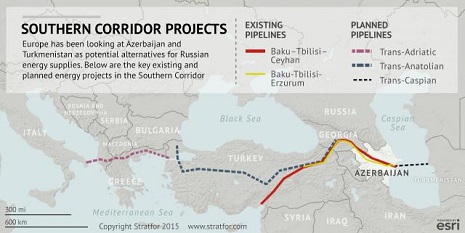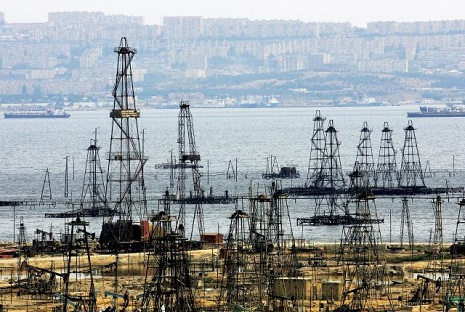Analysis
Azerbaijan`s economy is highly dependent on the country`s energy industry, with the hydrocarbons sector accounting for roughly 40 percent of GDP and more than 90 percent of exports. The dramatic fall in global oil prices, as well as a slight decrease in the country`s oil production because of maintenance works on the Azeri-Chirag-Guneshli oil field, contributed to a significant slowdown in 2014. Azerbaijan`s GDP grew by only 2.8 percent compared to 5.8 percent in 2013.
Non-Oil GDP Grows
However, the impact of falling oil prices was somewhat mitigated by a stronger performance in Azerbaijan`s non-energy related industries. Non-oil GDP, including construction, agriculture, transport and communications sectors, grew by 7 percent in 2014, while oil-related GDP contracted by 2.9 percent. Azerbaijan was also able to rely on its sovereign wealth fund, known as the State Oil Fund of the Republic of Azerbaijan. The fund has assets of over $37 billion and Baku used nearly $13 billion to help prop up the economy in 2014.
Still, Azerbaijan has seen negative impacts as well. The country`s central bank abandoned the currency peg of the manat to the dollar and switched to a dual-currency basket of dollars and euros on Feb. 16. The manat had been pegged to the dollar at just more than 0.78 manat per dollar since the middle of 2011. However, the central bank had spent more than $2 billion defending the currency since December. As of Feb. 19, the manat has been devaluated by 0.16 percent to the dollar.
But because of its relative diversification and the ample resources of its oil fund, Azerbaijan will likely weather the drop in oil prices. For 2015, Azerbaijan is projected to grow by 1.9 percent based on conservative oil prices of $55 per barrel. Though the growth rate is a marked slowdown compared to 2014, which had a budgeted price of $100 per barrel, it is favorable compared to other energy-dependent economies in the region such as Russia, whose economy is projected to contract by 3-5 percent. In January, Azerbaijan`s non-oil sector grew by a further 5.5 percent, though government funding in investment projects was cut by more than 50 percent.
Ukraine and Energy Supplies
Meanwhile, the crisis in Ukraine has again demonstrated the risk of Europe`s dependence on Russia as an energy supplier, creating opportunities for Azerbaijan. Russia cut off natural gas to Ukraine over several months in 2014. This cutoff, the third in less than a decade, significantly increased the attractiveness of Azerbaijan as an alternative energy supplier to Europe.
Azerbaijan is in an optimal position to take advantage of the Europeans` desire to diversify. It already uses the Southern Corridor route — designed to avoid Russia and transit Caspian-region energy supplies via Georgia and Turkey to Europe — to send oil and natural gas via the Baku-Tbilisi-Ceyhan and Baku-Tbilisi-Erzurum pipelines respectively. Baku has proven a reliable partner in these projects for the past decade. Azerbaijan has also been developing the Shah Deniz II natural gas field, which is set to come online in 2018 and add another 16 billion cubic meters (bcm) of natural gas to Azerbaijani production. Various consortia competed for access to the Shah Deniz II field, with the Trans-Adriatic pipeline — which will take Azerbaijani natural gas from Turkey to Italy via Greece and Albania — winning over the more ambitious but costly Nabucco West project.

Europe has also been pushing to expand Azerbaijan`s participation via the Trans-Caspian pipeline, which would link Turkmenistan to Azerbaijan over the Caspian Sea. Because all of Azerbaijan`s upcoming natural gas supplies are already accounted for in the Trans-Adriatic pipeline, the European Union has looked to Turkmenistan, which produces nearly 80 bcm of natural gas per year and has up to 30 bcm of natural gas available for export. However, the Trans-Caspian pipeline has long been hindered by legal issues over maritime demarcation in the Caspian Sea and opposed by both Russia and Iran. Turkmenistan has been cautious in challenging Russia though the Ukraine crisis and Russia`s decreased ability to import natural gas from Turkmenistan has caused Ashgabat to reassess its position.
Political Risks
The standoff between Russia and the West presents significant opportunities for Azerbaijan in energy, but not without political risks. The Trans-Caspian pipeline will take significant will from both the Europeans and Turkmenistan to challenge Russia, something they have not been able to do in the past despite years of discussions. Even the Trans-Adriatic pipeline, which is scheduled to start construction this year, has faced complications. The Greek government led by the Syriza party has attempted to change the terms of the contract to receive lower prices and higher transit fees. Azerbaijan`s energy firm State Oil Company of Azerbaijan Republic has so far rejected these requests out of concern for its own financial interest.
Azerbaijan has also maintained economic and energy relations with Russia so as not to alienate its neighbor. Baku will have to maneuver carefully between all of these projects, both in terms of their political sensitivity and commercial viability, and delays or changes to these projects cannot be ruled out in the context of low energy prices. Furthermore, Azerbaijan will be careful not to openly challenge Russia by fighting its ally, Armenia, over Nagorno-Karabakh. Azerbaijan has become more assertive in the conflict, serving as a useful tool for President Ilham Aliyev to drum up political support. Though Russia is focused on the Ukrainian crisis, Baku will still avoid a direct conflict.
Finally, many countries in the former Soviet Union have seen increased demonstrations and opposition activity following the fall of Ukrainian President Viktor Yanukovich, and Azerbaijan has been no exception. There have been several protests organized by opposition groups in Baku demanding the release of political prisoners (some have had participation in the low thousands). However, the government does not face any serious challenge to its rule, and Azerbaijan has the added benefit of its relatively balanced foreign policy position between Russia and the West. Azerbaijan will continue to cope with multiple crises, but with risks, both financial and political.









-1745485667.jpg&h=190&w=280&zc=1&q=100)






































